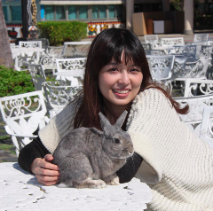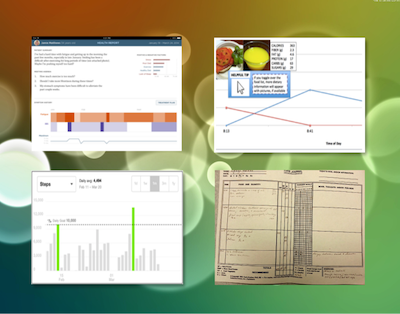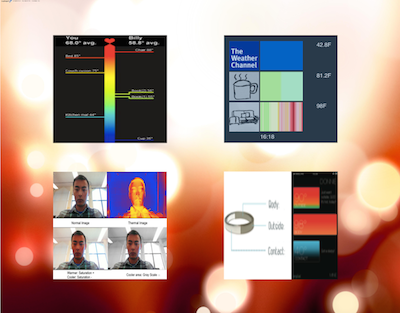
I am Christina Chung, an Assistant Professor in Computational Media at University of California, Santa Cruz. My research focuses on the intersection of Human-Computer Interaction and Health/Well-being. Specifically, I conduct research on how ubiquitous computing and personal informatics technology can be designed to enhance relationships, to motivate health behavior, and to support clinical care. Previously, I was an Assistant Professor in Informatics at Indiana University Bloomington.
I completed my Ph.D. in Human-Centered Design and Engineering from the University of Washington. I was advised by Sean Munson and was a member of the DUB group.
I hold a M.B.A and B.B.A in Information Management from the National Taiwan University, where I conducted research on designing embedded intrusion detection systems. In my previous life, I also worked as a software engineer in IBM Greater China Development Lab, Taipei, Taiwan to design industrial solutions that integrate novel technologies and complex enteprise systems, and in IBM Research Collaboratory Taiwan to conduct service innovation research in health and wellness.
 Eating and food preparation are social for many families. Collocated families use these opportunities to build shared experience. Family members living apart use these convesations to maintain connectedness, reminisce, and provide care. However, conversations about healthy eating can be challenging.
Eating and food preparation are social for many families. Collocated families use these opportunities to build shared experience. Family members living apart use these convesations to maintain connectedness, reminisce, and provide care. However, conversations about healthy eating can be challenging.
In a series of project, we seek to understand how family members communicate about eating and preparation experience and practices, how they cordinate eating and preparation, what challenges and tensions they encounter, and how they cope with these challenges.
This project is partly supported by NSF.
[CSCW2020 - Paper]· [CSCW2020 - Medium Article]· [CSCW2020 - Video]
 Consumer self-monitoring apps have been widely studied and used to promote healthy behavior change. People increasingly turn to these apps and wearable devices for health management. Datasets collected through these apps may potentially enrich clinical care without adding new user burdens.
Consumer self-monitoring apps have been widely studied and used to promote healthy behavior change. People increasingly turn to these apps and wearable devices for health management. Datasets collected through these apps may potentially enrich clinical care without adding new user burdens.
In this project, we sought to understand provider goal, needs, and their experience of use and non-use of lifelog data in chronic disease/symptoms management to support future design of personal informatic tools.
This project is funded by AHRQ.
[JMIR 2015] ·
[CSCW 2016] · [CSCW 2017]· [Medium Article - Fitbit in Doctor's office]· [IMWUT 2019]· [Medium Article - Redesigning Food Diaries]· [Foodprint Use Cases designed with Reos Partners and Robert Wood Johnson Foundation]
In this project, we partnered with UW Medicine, Group Health Research Institute, and Family Medicine of Yakima to understand the adoption of two blood pressure kiosks in clinic settings and how it might affect the clinic workflow.
We employed a series of mixed approches, including observations in staff meetings and the waiting room before and after the kiosks were introduced, focus groups with providers and staff, and patient surveys before and after the kiosks launched.
[JABFM 2016;29(5)]
 Goal setting theory has been studied and adopted in a variety of domains such as game, education, and health behavior change. In this project, we sought to examine whether having two goals – a primary goal and a backup goal – rather than one might affect people’s goal-setting behavior, which suggested but not further studied in previous literature. We designed three studies - a lab experiment, an online experiment, and a field experiment - to understand how different goal-setting scenarios predict performance.
Goal setting theory has been studied and adopted in a variety of domains such as game, education, and health behavior change. In this project, we sought to examine whether having two goals – a primary goal and a backup goal – rather than one might affect people’s goal-setting behavior, which suggested but not further studied in previous literature. We designed three studies - a lab experiment, an online experiment, and a field experiment - to understand how different goal-setting scenarios predict performance.
[IJHCS 2017] · [Medium Article]
 Temperature information is seen as intimate and reflective of health and comfort, and so sharing it between people in remote relationships may be particularly valuable for supporting those relationships.
Temperature information is seen as intimate and reflective of health and comfort, and so sharing it between people in remote relationships may be particularly valuable for supporting those relationships.
In this project, we probed how people in remote relationship might react to the information and what their concerns might be. We are also planning on future home deployment study to understand how people would actually use such information and to validate our preliminary findings.
[PDF] [Poster]
 We conducted contextual inquiries in a Multiple Sclerosis (MS) clinic with over 300 MS patients. MS is a chronic, progressive disease and case manageers (CM) played a critical role to manage the complex symptoms. Results from interviews and observations indicated inadequate information resources and systems led to higher effort and stress to manage individual's cases and orders. Based on the results, we developed a conceptual workflow model to serve as an information source architecture and a reference model of user interface design.
We conducted contextual inquiries in a Multiple Sclerosis (MS) clinic with over 300 MS patients. MS is a chronic, progressive disease and case manageers (CM) played a critical role to manage the complex symptoms. Results from interviews and observations indicated inadequate information resources and systems led to higher effort and stress to manage individual's cases and orders. Based on the results, we developed a conceptual workflow model to serve as an information source architecture and a reference model of user interface design.
[WISH 2013]
UCSC Silicon Valley Campus, Room 3257
3175 Bowers Ave
Santa Clara, CA 95054 USA